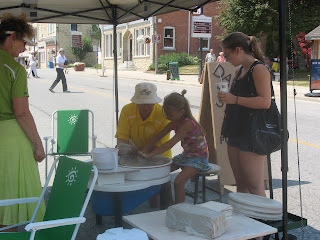Saturday, July 28
 |
| Blyth Lions Club Boys and Girls Band |
This afternoon I've been browsing through the Blyth Standards of the 1940s, in connection with one of our research projects. As often happens, the search has turned up some interesting facts that have nothing to do with what I was looking for.
Almost every issue of our old local paper in that time period has one or more front page items about the Blyth Lions' Club Boys' & Girls' Band. The articles included reviews of recent concerts, articles about upcoming band events, stories about band members who were competing in music festivals in nearby or distant communities.
The Boys' and Girls' Band consisted of about 45 to 50 Blyth and area young people - mostly in their teens - who came out regularly to band practices and were prepared to get all dressed up in their spiffy uniforms to take part in band tattoos, concerts, parades, church services, fall fairs, etc. They played a wide variety of musical styles - including some very difficult numbers. The instruments they played included coronets, alto horns, baritones, tubas, sousaphones, trombones, clarinets, saxophones, kettle drums and bass drums. They learned to march and perform complex maneuvers while playing music.
The old projection booth in Memorial Hall was full of band instruments that had been unused since the previous Citizen's Band was disbanded (no pun intended).
The old projection booth in Memorial Hall was full of band instruments that had been unused since the previous Citizen's Band was disbanded (no pun intended).
The leader of the band was Mr. A.C. Robinson of London, Ontario. "Robbie" as he was known by, was a very demanding leader and was very protective and supportive of the band. He was competitive, too, always wanting to prove that the band from this little burg was just a bit better than the other youth bands in the big city of London. The members paid a monthly fee for the lessons and for the use of the instruments. Some members purchased their instruments.
This band developed a number of very talented musicians. Some members had already developed their musical skills through piano or other types of musical training.
But the main thought that came to me while looking at these old local papers was the total impact of the band on the life of the community: the youths who were members, the parents of those members, the Lions' club, and the community as a whole.
What a wonderful opportunity we were given as teenagers to develop musical skills and the ability to entertain each other and the community as a whole. It opened up a whole realm of opportunity for many of us in the village. In addition, it provided the community with a widely respected ambassador group and a one that gave the entire village a sense of pride.
This band was one of the first major contributions of the newly formed Blyth Lions' club and that organization is to be commended for taking on such an ambitious project.
What a wonderful opportunity we were given as teenagers to develop musical skills and the ability to entertain each other and the community as a whole. It opened up a whole realm of opportunity for many of us in the village. In addition, it provided the community with a widely respected ambassador group and a one that gave the entire village a sense of pride.
This band was one of the first major contributions of the newly formed Blyth Lions' club and that organization is to be commended for taking on such an ambitious project.






